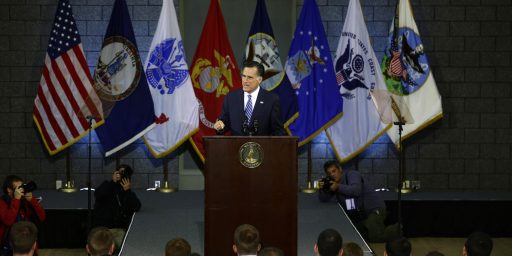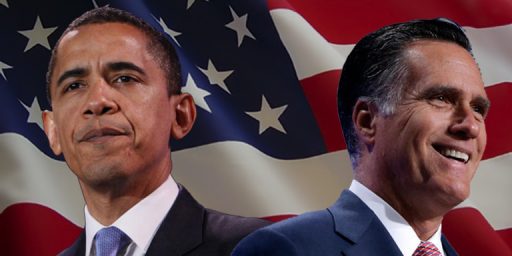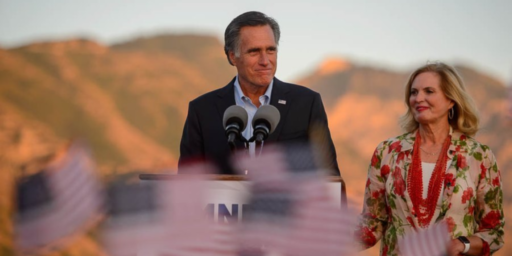Foreign Policy and the Election: Yes, it Matters
Earlier today Doug Mataconis asked Obama And Romney: A Dime’s Worth Of Difference On Foreign Policy?
I understand the basic point about the general direction of US foreign policy being unlikely to change under a Romney administration. However, clearly presidents matter. The Carter’s foreign policy wasn’t Reagan’s which wasn’t Bush’s which wasn’t Clinton’s which wasn’t Bush’s which wasn’t Obama’s.
Are there various themes, threads, and interests that run through the decades represented by the above list of names? This is certainly the case. However, no one is going to pretend that it didn’t matter that a given president was elected. Further, each president brings a new team. This matters as well.
One key question that is perhaps the most salient for November 2012 on the topic of foreign policy is: who will be giving the advice on Iran to the President of the United States in 2013? Which party is more likely to be populated by advisors more willing to support Israel at any cost and to behave belligerently towards Iran?
If one party is more likely to have pro-war advisors than the other then one cannot say that the election does not matter in regards to foreign policy.






Unless one is chewing on a massive pile of sour grapes as one is unhappy with either of the two choices…
I did not mean to imply in my post that foreign policy doesn’t matter in an election campaign, because it most assuredly does.
However, I was addressing the point Andrew Sullivan made which seemed to suggest that a Romney Administration would lead to a radical change in American foreign policy. I don’t think there’s any evidence to suggest that’s the truth.
If Romney is elected, which of the following is more likely to happen than if Obama wins:
1. The US involves itself in military action against Iran (unless Israel attacks before the election of course)
2. The US involves itself in military action in Syria (or whatever Muslim country next has an uprising).
3. The US ups it’s military commitment in both South Korea and Taiwan.
4. We try again to base ABM’s in Eastern Europe.
5. No talk of reducing global nuclear stockpiles except those of NK or Iran.
6. More expansion of the US military budget, with no talk of cuts.
7. Rumblings of a US intervention in the Mexican drug cartel wars.
No difference? What would constitute a major change for you guys?
Assuming a Republican victory and control of the House and Senate, Romney probably would not have to bypass Congress for approval to bomb Iran, Syria and North Korea. Plus it would be another Republican opportunity to cut taxes to pay for those war operations.
Let’s at least hope that Romney can pronounce “Malvinas”.
Also I sense agreement in the posts above that a military attack on Iran’s nuclear capacity would be a bad thing. Many of us think that’s still an open question.
An attack would certainly be risky. As would no attack. Especially if you are Israeli.
I am also given to understand that behind the scenes, Saudi and other officials are begging Israel to do something to stop Iran from going nuclear. Makes sense to me. .